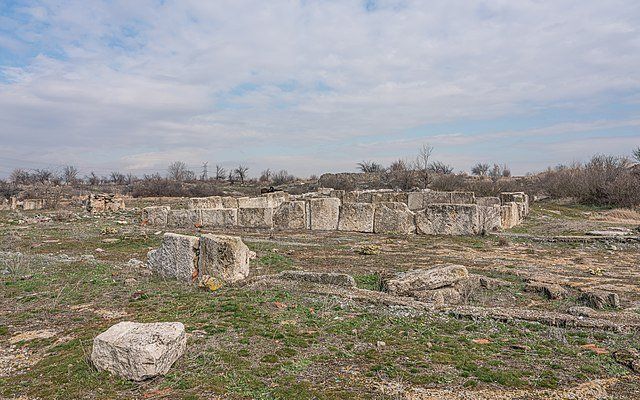Tucked away in your New Testament lies Paul’s short letter to Philemon, a letter consisting of just twenty-five verses. ‘Philemon’ is the shortest of all Paul’s epistles, and can be read right through in less time than it takes to boil an egg.
The background
The human circumstances which gave rise to this letter are intriguing. Philemon himself was a Christian of high standing who lived in the city of Colosse. Having been converted under Paul’s ministry, he put his house at the disposal of the Lord’s people, opening it up for Christian fellowship.
Philemon also had a slave — his name was Onesimus. Taking advantage of his Christian master one day, Onesimus robbed him and fled with the takings to the far-away city of Rome.
Here, in the capital of the Empire, every vice and pleasure was his for the taking. No doubt he intended to live fast and loose, with no thought for the morrow, and certainly no thought for God.
Budget error
Onesimus, though, had not budgeted for divine intervention. In the providence of God, he came across the apostle Paul, who had been imprisoned in Rome for the gospel. Paul told him about Christ and, by God’s grace, Onesimus was enabled to trust in the Saviour, being soundly and supernaturally converted.
We know that ‘if any one is in Christ, he is a new creation’ (2 Corinthians 5:17). So, were all Onesimus’s problems over? Yes and no! There was a dilemma.

Paul was sure that the right course of action was for Onesimus to return to his master Philemon in Colosse. But Onesimus had his doubts. What kind of reception would Philemon give him?
Paul’s solution was to send Onesimus back to Philemon with a ‘covering note’ from himself. The epistle to Philemon in our New Testaments is the result. ‘I appeal to you for my child, Onesimus, whose father I have become in my imprisonment … have him back … no longer as a slave but more than a slave, as a beloved brother’ (vv. 10, 15,16).
Under the inspiration of the Holy Spirit, and the superintending providence of God, this personal letter from Paul became part of the inspired Volume. It is ours to read, ponder and enjoy today. The world of Philemon, Onesimus and Paul was, of course, far removed from ours. Why, then, should we take the time and effort to study ‘Philemon’?
Knowing God
Firstly, in reading ‘Philemon’ our knowledge of God is enlarged. In ‘Philemon’ we see the providence of God at work. The epistle assures and reassures us that our God ‘accomplishes all things according to the counsel of his will’ (Ephesians 1:11).
The Shorter Catechism defines God’s works of providence as ‘his most holy, wise and powerful preserving and governing all his creatures and all their actions’ (Q.11). We see this demonstrated here, where Philemon’s misfortune, Onesimus’s rebellion, and Paul’s imprisonment, were all under God’s sway. All were woven into the overall divine purpose for the salvation of a sinner and the glory of his name.
‘Philemon’ also increases our confidence in God’s effectual calling. Those chosen in Christ before the foundation of the world will surely come to faith in Christ in due time. Nothing can hinder the divine purpose.
Humanly speaking, the chances of Onesimus coming to saving faith were very slim, especially now that he was far away from his Christian master, and free to sample the enticing and depraved distractions on offer in Rome.

Effectual call
But the Lord will save his people, for he has provided a Saviour-substitute to die on Calvary’s cross. He is just as active in calling his people to salvation in the present as he was in the past. Chapter X of the Westminster Confession puts it this way (bear Onesimus in mind as you read the following):
‘All those whom God hath predestined unto life and those only, he is pleased, in his appointed and accepted time, effectually to call, by his Word and Spirit, out of that state of sin and death, in which they are by nature, to grace and salvation, by Jesus Christ, enlightening their minds spiritually and savingly to understand the things of God, taking away their heart of stone and giving unto them a heart of flesh; renewing their wills, and by his almighty power, determining them to that which is good, and effectually drawing them to Jesus Christ: yet so, as they come most freely, being made willing by his grace’.
Knowing Paul
Secondly, in reading ‘Philemon’ our knowledge of Paul is enhanced. ‘Philemon’ is an intensely personal letter in which the apostle Paul lays bare his head, heart, humanity and even humour.
Paul was primarily an ambassador of the gospel of reconciliation. To reconcile means to bring together two parties who had previously been opposed. In Christ, God has reconciled us to himself by pardoning the sin that alienates us from him.
Paul, however, wanted to see this heavenly reality worked out on earth. Both Philemon and Onesimus had been reconciled to God through Christ. What a Christian testimony it would be to see Onesimus reconciled to his master!

‘Philemon’ is a charming letter, a model of tact, diplomacy and even affection. Paul was not a man to throw his weight around. As an apostle, he had considerable authority, but lording it over others was not for him: ‘Though I am bold enough in Christ to command you to do what is required, yet for love’s sake I prefer to appeal to you — I, Paul, an ambassador and now a prisoner for Christ … I preferred to do nothing without your consent in order that your goodness might not be by compulsion but of your own free will receive him as you would receive me’ (vv. 8-9,14,17).
Accepting suffering
Paul wrote to Philemon from the ‘comfort’ of a prison cell. The epistle, though, gives no inkling of complaint about his harsh circumstances. He describes himself ‘as a prisoner for Christ Jesus’.
He accepted his suffering meekly, as from the hand of a loving God. He looked beyond the so-called ‘secondary causes’ and was able to say: ‘take what he gives, and praise him still, through good and ill, who ever lives’.
Paul’s wholesome humour is rarely considered. The original Greek of ‘Philemon’ reveals that Paul enjoyed the occasional pun and wordplay. The name ‘Onesimus’ means ‘useful’ or ‘beneficial’. Philemon, then, would have raised a wry smile when he read ‘Formerly he was useless to you, but now he is indeed useful to you and me’ (v.11). Then in v.20: ‘Yes, brother, I want some benefit (onaimen) from you in the Lord’. Paul had a winsome personality and grace had made the former Pharisee even more human.

Knowing ourselves
Finally, in reading ‘Philemon’ our knowledge of ourselves is increased. ‘Philemon’ is the story of a runaway slave. But aren’t we all runaways? By nature, our sin makes us run away from our Maker — just as it did our first ancestors who tried to hide from God in Eden’s garden.
But if we are Christians, we (like Onesimus) have been arrested by the grace of God. He has overcome the seemingly insurmountable obstacles. He has brought us to the foot of the cross and reconciled us to himself. Each one of us has been adopted into his family, ‘no longer a slave, but … a beloved brother’ (v.16).
Interestingly, Paul undertook to be Onesimus’s guarantor. In his letter to Philemon he pledged: ‘If he has wronged you at all, or owes you anything, charge that to my account. I, Paul, write this with my own hand, I will repay it’ (v.19).
Guarantee
As believers, we know that our sins were charged to Christ’s account. He paid for them in full. His sinless life and sacrificial death alone suffice a holy God, and is sufficient to save us for all eternity.
Christ alone is our guarantee of salvation, for ‘in this is love, not that we loved God but that he loved us and sent his Son to be the propitiation for our sins’ (1 John 4:10).
Why not take time to give ‘Philemon’ a careful and prayerful reading? In meditating on its contents, your knowledge of God will be enlarged, your knowledge of the apostle Paul enhanced, and your knowledge of yourself — a sinner saved by the grace of God in Jesus Christ — increased.
Philemon is a neglected portion of Scripture, but when read, known and made known, it proves to be a tonic to the soul.










